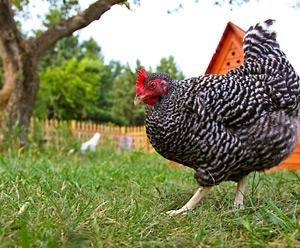BC’s Conservation Officer Service has asked the City of Powell River to allow electric fencing in residential areas as a preventive tool against bears preying on backyard chickens.
Council adopted amendments to the animal control bylaw in December 2012 that allow residents to keep up to three poultry on any size lot in residential areas. The bylaw defines poultry as domestic fowl, or hens, ducks, geese, turkeys, pigeons or similar birds. However, no roosters are allowed.
Gerry Lister, a Powell River conservation officer, made a presentation at a recent committee-of-the-whole meeting. He explained that under provincial legislation, conservation officers can force residents to install electric fencing in areas that are zoned to legally have it. Under the old animal control bylaw, areas zoned RA1, A1 and A2 could have chickens. “Those were the exact same zones that can have an electric fence,” he said. “Now we have the ability to have three poultry on R1, R2 and R3 parcels, but the zoning bylaw doesn’t allow electric fences to be in place on those parcels. That for us is one of the key tools.”
The issue is about public safety, Lister said, because once bears come in and start getting into chickens, they’re going to be infiltrating the neighbourhood and getting into other things. “You increase the risk to kids, to adults, to elderly people, to anybody in the neighbourhood,” he said. “You also increase the risk when we have to attend and destroy a bear that’s at large and a danger to the public. We don’t always just set a trap and haul the bear away. Sometimes we have to use a firearm and that increases the danger.”
Electric fencing is an effective preventive measure, Lister said, and he provided information which documented it is not dangerous, including to children. He read from a document that stated, “Getting zapped by an electric fence doesn’t do any permanent damage to bears or people, but it’s highly unpleasant, so put up a warning sign.” That could be a provision of the zoning bylaw, Lister said, requiring residents who install electric fences to also post a warning sign.
Lister also pointed out the city’s animal control bylaw is vague about how shelters can provide protection from natural predators. “It doesn’t set a standard for how you provide that protection,” he said. “Protection from natural predators could be interpreted by one person as being a cardboard box to keep hawks and eagles from going in and taking chickens. Our interpretation would be something that’s suitable to prevent bears or raccoons or even bobcats from accessing those chickens.”
At the minimum, Lister said, he would like the city to provide a Conservation Officer Service brochure that describes how to build a predator-resistant chicken coop, by putting a copy on its website and making it available at the planning counter.
Lister said that 10 to 12 per cent a year of calls about bear conflicts in Powell River are related to chickens. “We don’t want that number to go up to 15 or 20 per cent, obviously,” he said. “We feel this is a step in the right direction to prevent that from happening and to give us the tools in our toolbox to be able to do a good job and keep the public safe.”
After Lister’s presentation, councillors referred the issue to staff for a report.



